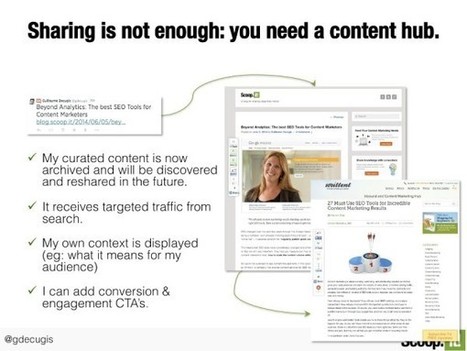
|
Scooped by
Robin Good
April 30, 2015 10:13 AM
|
"If you can be a guide, a clearinghouse, a trusted place from where to learn, appreciate and understand more, there is no amount of outbound links that is going to counter the magnetic force you will express to those who are interested in what you are pointing to."
This is why the fear every company has about content curation - talking about *others* in the same field - has not only no reason to exist, but it is also downright counterproductive as soon as others start using it.
Content curation is a venue to make sense of existing information to facilitate access, discovery, comparison, understanding, both on the side of who curates as well as on the one of those who benefit from it.
Part of my inspiration in becoming so passionate and interested in content curation, has been ignited by a post that appeared in 2004, on Robert Scoble's popular tech blog.
In it, I read: "It's the new marketing... Instead of being desperate and saying "look at me look at me" you tell your readers to get lost.
Go someplace else.
What's the philosophy?
Those sites will take you to the coolest stuff on the Internet. And by doing that, Engadget and Gizmodo have BECOME the coolest places on the Internet. Just like Craig's List, Google, eBay."
Takeaway: The more valuable resources, info and tools you share with your audience/community the more trustworthy and reputable you will appear in their hearts and eyes.
"Send your visitors away" is a simple but valuable content marketing advice and it is at the heart of what a good content curator does. Finding and sharing great resources that would have otherwise gone unnoticed.
Read more:
http://www.masternewmedia.org/news/2004/11/03/want_some_attention_tell_your.htm
Robert Scoble original post: http://radio-weblogs.com/0001011/2004/10/31.html#a8544
See also this slide deck I did in 2007: http://www.slideshare.net/RobinGood/be-your-own-boss
(check slides 21-22)
Image credit: Showing direction by Shutterstock



 Your new post is loading...
Your new post is loading...




























From Robin Goode's scoop note: "
"If you can be a guide, a clearinghouse, a trusted place from where to learn, appreciate and understand more, there is no amount of outbound links that is going to counter the magnetic force you will express to those who are interested in what you are pointing to."
This is why the fear every company has about content curation - talking about *others* in the same field - has not only no reason to exist, but it is also downright counterproductive as soon as others start using it.
Content curation is a venue to make sense of existing information to facilitate access, discovery, comparison, understanding, both on the side of who curates as well as on the one of those who benefit from it.
Part of my inspiration in becoming so passionate and interested in content curation, has been ignited by a post that appeared in 2004, on Robert Scoble's popular tech blog.
In it, I read: "It's the new marketing... Instead of being desperate and saying "look at me look at me" you tell your readers to get lost.
Go someplace else.
What's the philosophy?
Those sites will take you to the coolest stuff on the Internet. And by doing that, Engadget and Gizmodo have BECOME the coolest places on the Internet. Just like Craig's List, Google, eBay."
Takeaway: The more valuable resources, info and tools you share with your audience/community the more trustworthy and reputable you will appear in their hearts and eyes.
"Send your visitors away" is a simple but valuable content marketing advice and it is at the heart of what a good content curator does. Finding and sharing great resources that would have otherwise gone unnoticed. "
Read more:
http://www.masternewmedia.org/news/2004/11/03/want_some_attention_tell_your.htm ;
Robert Scoble original post: http://radio-weblogs.com/0001011/2004/10/31.html#a8544 ;
See also this slide deck I did in 2007: http://www.slideshare.net/RobinGood/be-your-own-boss ;
(check slides 21-22)
Image credit: Showing direction by Shutterstock